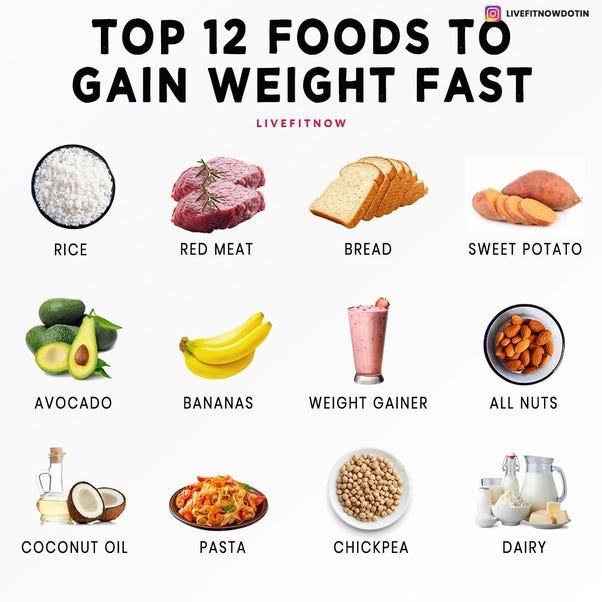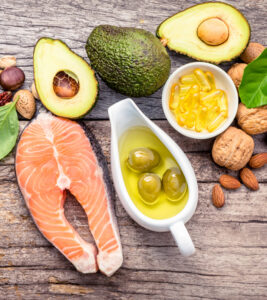
What Foods Help You Gain Weight the Fastest?
Gaining weight requires consuming more calories than you use throughout the day. You also need to increase protein and healthy fats in your diet.
Eat dense fruits and vegetables, starchy foods such as potatoes and corn, dairy products, eggs, lean meats, whole grains and nuts and seeds. Avoid empty calories, such as those found in soda and many sugary drinks.
Whole-grain bread
Whole grains provide complex carbohydrates for energy, and are a healthy alternative to white bread. They are also high in fiber, which promotes satiety. Choose a variety of grains, such as whole wheat, brown rice and barley. Try incorporating them into soups, stews and casseroles.
When shopping for bread, look for the words “whole grain” in the ingredients list. However, it is important to note that not all products labeled as whole grain actually are. Some are simply fortified with nutrients, such as folic acid and iron.
A whole grain contains three parts: bran, germ and endosperm. Refined grains, on the other hand, are milled and processed to remove the bran and germ, leaving only the endosperm. This makes the flour look lighter and bake fluffier, but it also loses valuable vitamins and minerals (7).
Starchy vegetables
All vegetables are healthy, but those that contain starch – potatoes, corn and peas – get a bad rap because they have more carbohydrates and calories than non-starchy vegetables like leafy greens, tomatoes and peppers. But when they’re eaten in moderation, starchy vegetables can be a nutritious addition to any meal.
Starchy vegetables such as white and sweet potatoes, beans (like pinto, garbanzo and lentils) and corn are a good source of complex carbohydrates. They also provide vitamins and minerals, such as potassium and magnesium, which can help control blood pressure and prevent migraine headaches.
Lean beef
Lean beef is a good source of protein, which helps you gain weight by building muscles. It also contains other nutrients, such as iron, which is essential for transporting oxygen to your muscles. It’s important to choose lean cuts of beef, as these contain less fat and cholesterol. Look for “lean” or “extra lean” on the label, as well as cuts of meat that are trimmed of all visible fat. Try tenderloin, top sirloin, tri-tip and flat-half brisket.
Consume red meat in moderation, as it contains a high amount of calories. For example, three ounces (85 grams) of cooked ground beef has about 200 calories. Also, limit consumption of organs, such as liver, to about 3 ounces per month. (2).
Eggs
Eggs are an excellent source of protein, which helps build muscle and increase metabolism rates. They also contain high levels of calories, vitamins, minerals and antioxidants. Eggs are low in fat and sodium. They are also inexpensive and versatile. You can eat them for breakfast, lunch or dinner.
Adding eggs to your diet can help you gain weight quickly. You should eat 3-6 eggs a day, which can come from whole eggs or egg whites. A medium-sized egg contains about 80 calories.
You can eat them boiled, scrambled or in an omelette. You should avoid consuming raw eggs, as they can cause food poisoning. If you do eat them, make sure to cook them well. Raw eggs may contain salmonella bacteria. You should also avoid eating undercooked or raw eggs, as they can cause gastrointestinal distress and stomach irritation.
Whole milk
Milk is a good source of protein and other nutrients that help you gain weight. It also contains fat and carbohydrates, which are essential for your health. Choose from whole, reduced-fat, low-fat or fat-free milk to get the right amount of calories and fat for your diet.
Drinking whole milk may raise your cholesterol levels, but recent research suggests that it doesn’t increase the harmful LDL cholesterol and it does not affect HDL “good” cholesterol. Milk is also high in calcium, which helps maintain strong bones and reduces your risk of osteoporosis.
One cup of whole milk provides about 150 calories and eight grams of fat. Try drinking two or three glasses of milk per day, but remember to watch your total calorie intake.
Tofu
A good source of protein and healthy fats, tofu is also high in calcium and other nutrients. It can be used in a variety of dishes and is a versatile meat substitute. It is available in many different forms, from soft tofu that can be blended into condiments to firm tofu that can be used in sandwiches and soups.
Other food sources of protein that are similar to tofu include tempeh, quinoa, lentils, and nuts. Tempeh and tofu are both made from soy, but tempeh has a more complex flavor and is denser than tofu.
Chickpeas, or garbanzo beans, are another protein-rich option that can be used in place of tofu. They have a nutty taste and grainy texture that makes them a staple in Mediterranean cuisine. They are also a great substitute for tofu in vegetarian and vegan diets.
Honey
Honey contains 64 calories per tablespoon, and while it is healthier than sugar, it can still contribute to weight gain if eaten in excess. It also helps to promote digestion, reduce cholesterol and triglycerides, and heal wounds.
Adding a teaspoon of honey to warm water in the morning on an empty stomach has been shown to reduce cravings and increase energy levels throughout the day. This can make it easier to stick to your calorie-counting goals.
To maximise the benefits of honey for weight loss, choose raw varieties that have not been pasteurised or filtered. This will help you avoid added syrups, which may negate any potential health-promoting properties. Choose natural brands that contain a variety of antioxidants, including flavonoids and phenolic acids such as caffeic acid and coumaric acid.


